Audi Q7 vs Mercedes EQS SUV – Performance, range & efficiency compared
Two cars, one duel: Audi Q7 meets Mercedes EQS SUV.
Which one wins in performance, efficiency and value for money? Find out now!
Costs and Efficiency:
When it comes to price and running costs, the biggest differences usually appear. This is often where you see which car fits your budget better in the long run.
Audi Q7 has a noticeable advantage in terms of price – it starts at 69300 £, while the Mercedes EQS SUV costs 95000 £. That’s a price difference of around 25630 £.
As for range, the Mercedes EQS SUV performs decisively better – achieving up to 695 km, about 611 km more than the Audi Q7.
Engine and Performance:
Power, torque and acceleration are the classic benchmarks for car enthusiasts – and here, some clear differences start to show.
When it comes to engine power, the Mercedes EQS SUV has a evident edge – offering 658 HP compared to 507 HP. That’s roughly 151 HP more horsepower.
In acceleration from 0 to 100 km/h, the Audi Q7 is barely noticeable quicker – completing the sprint in 4.10 s, while the Mercedes EQS SUV takes 4.40 s. That’s about 0.30 s faster.
In terms of top speed, the Audi Q7 performs slightly better – reaching 250 km/h, while the Mercedes EQS SUV tops out at 210 km/h. The difference is around 40 km/h.
There’s also a difference in torque: Mercedes EQS SUV pulls to a small extent stronger with 950 Nm compared to 770 Nm. That’s about 180 Nm difference.
Space and Everyday Use:
Whether family car or daily driver – which one offers more room, flexibility and comfort?
Seats: Audi Q7 offers clearly perceptible more seating capacity – 7 vs 5.
In curb weight, Audi Q7 is distinct lighter – 2055 kg compared to 2695 kg. The difference is around 640 kg.
In terms of boot space, the Audi Q7 offers distinct more room – 887 L compared to 645 L. That’s a difference of about 242 L.
In maximum load capacity, the Audi Q7 performs barely noticeable better – up to 2255 L, which is about 155 L more than the Mercedes EQS SUV.
When it comes to payload, Audi Q7 evident takes the win – 885 kg compared to 570 kg. That’s a difference of about 315 kg.
Who wins the race?
The Mercedes EQS SUV proves to be offers a more balanced package and therefore becomes our DriveDuel Champion!
Mercedes EQS SUV is the better all-rounder in this comparison.
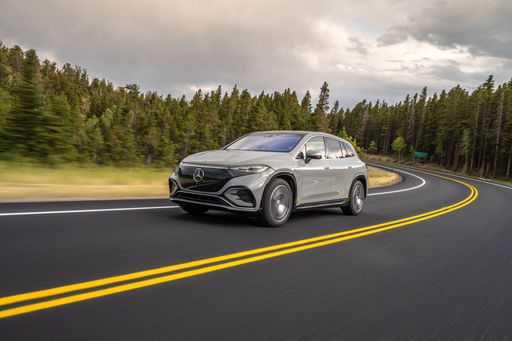
Mercedes EQS SUV
Audi Q7
The Audi Q7 combines luxurious comfort with impressive versatility, making it a standout choice in the SUV market. Its sophisticated design and meticulous attention to detail create an elegant yet robust presence on the road. With advanced technology and a focus on safety, the Q7 ensures a premium driving experience for both the driver and passengers.
details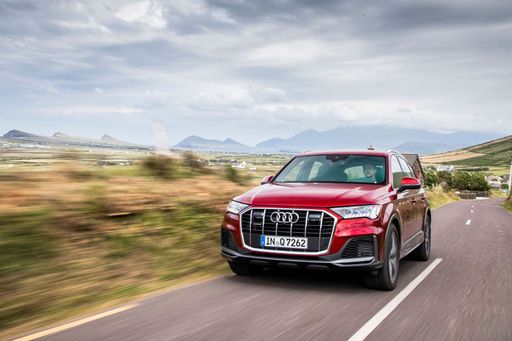 @ audi-mediacenter.com
@ audi-mediacenter.com
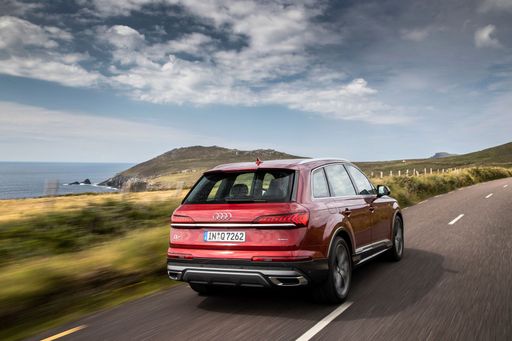 @ audi-mediacenter.com
@ audi-mediacenter.com
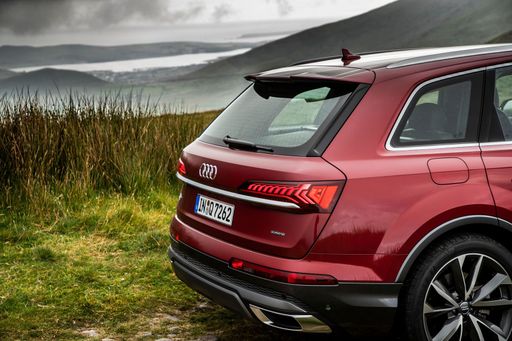 @ audi-mediacenter.com
@ audi-mediacenter.com
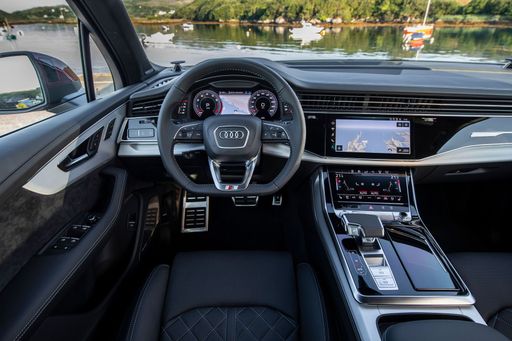 @ audi-mediacenter.com
@ audi-mediacenter.com
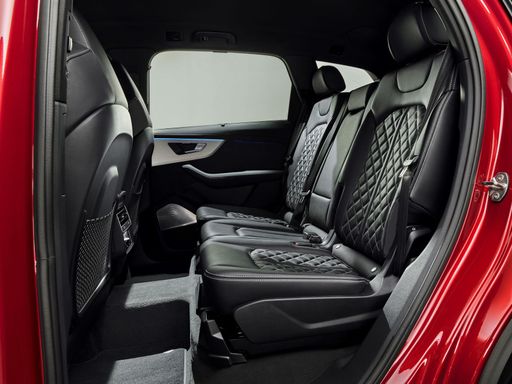 @ audi-mediacenter.com
@ audi-mediacenter.com
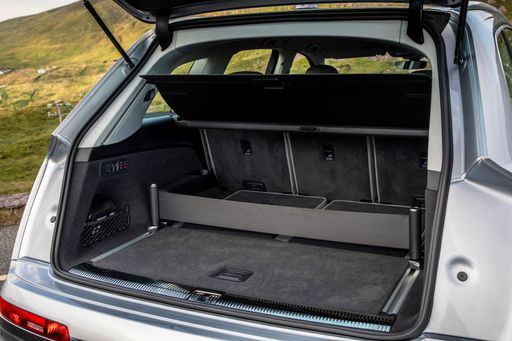 @ audi-mediacenter.com
@ audi-mediacenter.com
Mercedes EQS SUV
The Mercedes-Benz EQS SUV redefines luxury in the electric vehicle segment with its elegant design and cutting-edge technology. Its spacious interior provides exceptional comfort, featuring high-quality materials and innovative ambient lighting to create a serene driving environment. This SUV impressively combines sustainability with performance, offering a smooth and quiet ride without compromising on power.
details @ group-media.mercedes-benz.com
@ group-media.mercedes-benz.com
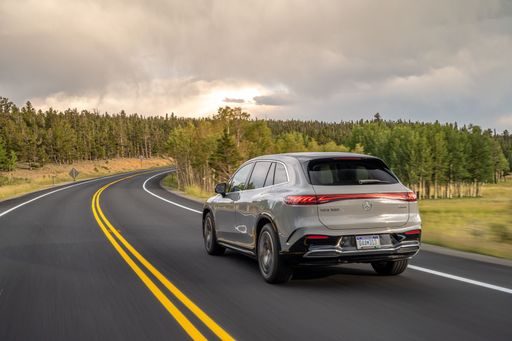 @ group-media.mercedes-benz.com
@ group-media.mercedes-benz.com
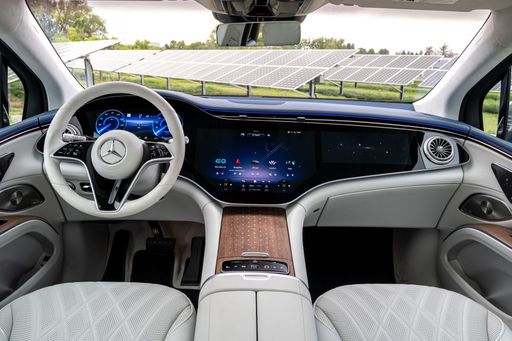 @ group-media.mercedes-benz.com
@ group-media.mercedes-benz.com
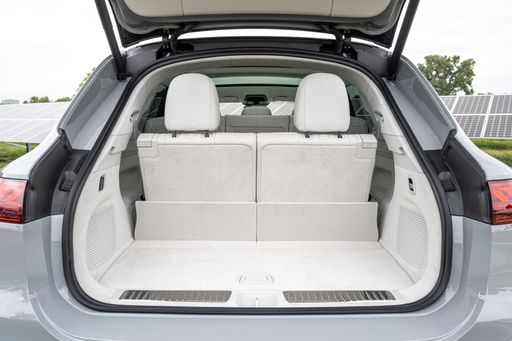 @ group-media.mercedes-benz.com
@ group-media.mercedes-benz.com

|

|
|
|
|
Costs and Consumption |
|
|---|---|
|
Price
69300 - 99000 £
|
Price
95000 - 212100 £
|
|
Consumption L/100km
1.2 - 11.9 L
|
Consumption L/100km
-
|
|
Consumption kWh/100km
-
|
Consumption kWh/100km
19.6 - 21.9 kWh
|
|
Electric Range
83 - 84 km
|
Electric Range
615 - 695 km
|
|
Battery Capacity
22 kWh
|
Battery Capacity
108.4 - 118 kWh
|
|
co2
28 - 271 g/km
|
co2
0 g/km
|
|
Fuel tank capacity
75 - 85 L
|
Fuel tank capacity
-
|
Dimensions and Body |
|
|---|---|
|
Body Type
SUV
|
Body Type
SUV
|
|
Seats
5 - 7
|
Seats
4 - 5
|
|
Doors
5
|
Doors
5
|
|
Curb weight
2055 - 2460 kg
|
Curb weight
2695 - 3075 kg
|
|
Trunk capacity
563 - 887 L
|
Trunk capacity
440 - 645 L
|
|
Length
5072 mm
|
Length
5125 mm
|
|
Width
1970 mm
|
Width
1959 - 2034 mm
|
|
Height
1703 - 1735 mm
|
Height
1718 - 1721 mm
|
|
Max trunk capacity
1863 - 2255 L
|
Max trunk capacity
2100 L
|
|
Payload
640 - 885 kg
|
Payload
425 - 570 kg
|
Engine and Performance |
|
|---|---|
|
Engine Type
Petrol MHEV, Plugin Hybrid, Diesel MHEV, Petrol
|
Engine Type
Electric
|
|
Transmission
Automatic
|
Transmission
Automatic
|
|
Transmission Detail
Automatic Gearbox
|
Transmission Detail
Reduction Gearbox
|
|
Drive Type
All-Wheel Drive
|
Drive Type
All-Wheel Drive, Rear-Wheel Drive
|
|
Power HP
231 - 507 HP
|
Power HP
360 - 658 HP
|
|
Acceleration 0-100km/h
4.1 - 7.1 s
|
Acceleration 0-100km/h
4.4 - 6.8 s
|
|
Max Speed
226 - 250 km/h
|
Max Speed
210 km/h
|
|
Torque
500 - 770 Nm
|
Torque
568 - 950 Nm
|
|
Number of Cylinders
6 - 8
|
Number of Cylinders
-
|
|
Power kW
170 - 373 kW
|
Power kW
265 - 484 kW
|
|
Engine capacity
2967 - 3996 cm3
|
Engine capacity
-
|
General |
|
|---|---|
|
Model Year
2025
|
Model Year
2024
|
|
CO2 Efficiency Class
G, B
|
CO2 Efficiency Class
A
|
|
Brand
Audi
|
Brand
Mercedes-Benz
|
Is the Audi Q7 offered with different drivetrains?
Available configurations include All-Wheel Drive.
The prices and data displayed are estimates based on German list prices and may vary by country. This information is not legally binding.
